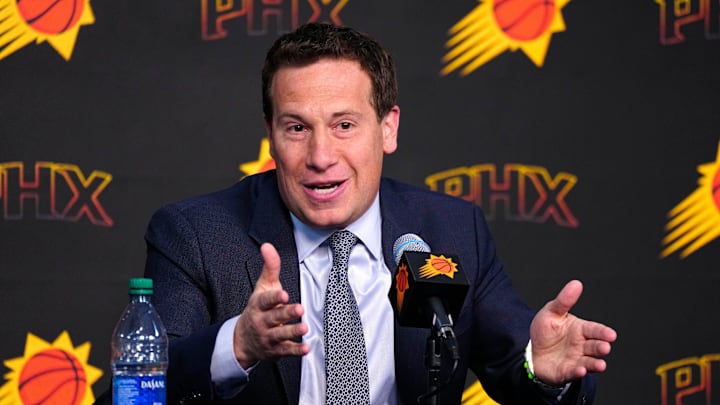When the NBA Draft takes place on June 26th, the Phoenix Suns will gain the ability to trade this year’s first rounder and one in 2031. Those picks have been off limits due to rules that prevent trading first rounders in back-to-back years as well as more than seven years into the future.
Both picks would instantly be among the Suns’ better assets, with the 2031 pick arguably being the absolute best unless they blow up their roster and trade Devin Booker or Kevin Durant.
Attaching either pick to Jusuf Nurkić or Nassir Little in a trade would enrich the return, and is the most realistic way to land a game changer this offseason. On the other hand, drafting and developing a player would add some much needed youth and cost-controlled talent.
The debate on what do with the picks may be an interesting one, but it seems like it has already been resolved by the front office and ownership.
General Manager James Jones has a well-known proclivity for trading picks instead of making them, and Mat Ishbia seems to share that sentiment. At a press conference last month, Ishbia all but said those picks would definitely be moved.
The Suns plan to shop the No. 22 overall selection and their 2031 first-round pick in trade talks this offseason, which are officially eligible to be dealt on draft night.
— Evan Sidery (@esidery) May 3, 2024
Suns owner Mat Ishbia views draft picks as assets for established players instead of trying to develop… pic.twitter.com/XV9rkg2MDZ
Ishbia's logic may be sound, especially in regards to the 2031 pick, but there are some considerations the Suns should take into account that push back on that thought process.
For one, the constraints the second apron puts on teams makes young, cheap players that much more valuable. With the Suns only being able to sign players to the minimum, their best shot at acquiring a talented player without losing another via trade is by hitting on a draft selection.
The Suns aren't getting out from under the apron anytime soon, which means their draft picks will begin to be pushed to the end of the round as a penalty for being in it for several years. This could be one of the last years in a while that they're able to draft someone in the early 20s.
And while this draft has been derided for its lack of top-end talent, that won't be a problem picking at 22. There will certainly be some solid role players on the board who can contribute immediately.
Furthermore, the pick just isn't that valuable as a trade asset. Depending on how the board breaks, some teams might not be interested in the players available when the Suns pick, limiting their suitors. And if the Suns were to make the selection with the intention to move the player later, their trade partners would be even more limited based on the type of player they drafted.
It's possible that when their selection rolls around a player might be on the board that another team covets. In that case it would have more trade value, but in general a pick in the 20s isn't exactly going to cause a bidding war.
As for the 2031 pick, Ishbia’s flippant attitude towards it is more justified. Not only will the current Suns window with Durant be long closed by then, but Booker will be entering his age 35 season.
3 years ago today, Devin Booker and Chris Paul showed out in a pivotal Game 3 of the Western Conference Semifinals vs the Nuggets:
— Booker Muse (@DevinBookerMuse) June 11, 2024
Booker — Paul —
28 PTS 27 PTS
6 REB 6 REB
4 AST 8 AST pic.twitter.com/fN4REHIaV9
If the Suns are concerned about building around an aging Booker, they will have several more picks to use or trade over the next few years. The 2031 would have little value for them even in that scenario.
So there's really no point in not trading the pick. The Suns could get several years worth of value in the coming seasons from it as opposed to waiting seven years to cash it in.
This pick might actually see a bidding war, with teams noting the Suns unstable long-term situation and potential to be picking higher in a likely stronger draft. That should guarantee them a good return.
The only argument against trading that pick right now would be to hold onto it until the trade deadline if the Suns don’t like the offers they’re receiving. Trading it any later than that wouldn’t be maximizing the value it can provide for this window.
This hybrid approach of keeping this year's pick and trading the 2031 first is what the Suns should ultimately favor. They could land an instant-impact young player while also acquiring a significant upgrade in a trade. That would involve Jones and Ishbia being willing to make a selection and hitting on the pick, but it's not out of the question if they play their cards right.
